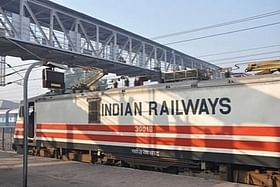Snapshot
-
The increased budgetary support envisages proliferation of modern trains, rapid electrification, induction of Kavach and big order for wagons and rails for the future.
Seeking a major push in rail infrastructure, the government is likely to increase the allocation to the Railways significantly, in the next fiscal, to support the massive modernisation and substantial growth in loadings along with new rolling stock programme, in the coming Budget.
The gross budgetary support (GBS) for Railways is expected to increase by about 29 per cent from Rs 1.4 lakh crore, in the current financial year, to Rs 1.8 lakh crore in 2023-24 fiscal.
The increased GBS envisages proliferation of modern trains like Vande Bharat, Tejas and Humsafar service, rapid electrification, induction of Kavach, the accident prevention measure and big order for wagons and rails for the future.
Prime Minister Narendra Modi had said that in the next eight years, India will see the Railways on a new journey of modernisation.
“Central government is taking record investments to modernise Indian Railways. Now modern trains like Vande Bharat Express, Tejas Express and Humsafar Express are being made in India. In the next eight years, we will see the Railways on a new journey,” Prime Minister Modi said, while inaugurating several rail projects for Bengal on 30 December.
The Railways is likely to go for a mega order of 50,000 wagons to be supplied by 2027-28 at an estimated cost of Rs 25,000 crore.
The induction of more wagons in the fleet is expected to increase the Railways’ market share in transporting cargo to 50 per cent by 2030.
Currently, the share of the Railways in India’s cargo market is 27 per cent, second to about 60 per cent for roadways. The Railways carried 1,418.1 million tonne of freight in 2022.
The Railways had a mega order last year of more than Rs 31,000 crore, for the purchase of 90,000 wagons to transport coal, cement, and food grains, among other goods, and achieve a loading target of 5 million tonne per day.
The Railways has asked for about 30 per cent more allocation for the next fiscal year which is supposed to be used for fast-tracking many infrastructure projects.
About Rs 1.02 lakh crore, out of the capital expenditure budget, has been spent till the end of October.
The budget to be presented in February is likely to include a timeline to lay an additional 100,000 km of rail tracks, including the doubling of existing ones, in the next 25 years.
The Indian Railways will aim to start construction of around 4,000 km of new tracks in 2023-24 as part of the 100,000 km to be added. The Budget is also slated to announce about 300-400 more Vande Bharat trains.
The Kavach, the indigenously built safety device, would be inducted in major trunk routes across the country in the first phase.
The Railways has kept projections for internal revenue for FY24 at almost the same level as in FY23. Internal revenue was estimated at Rs 2,40,000 crore in FY23, which is 19 per cent higher than the revised estimate for FY22.


